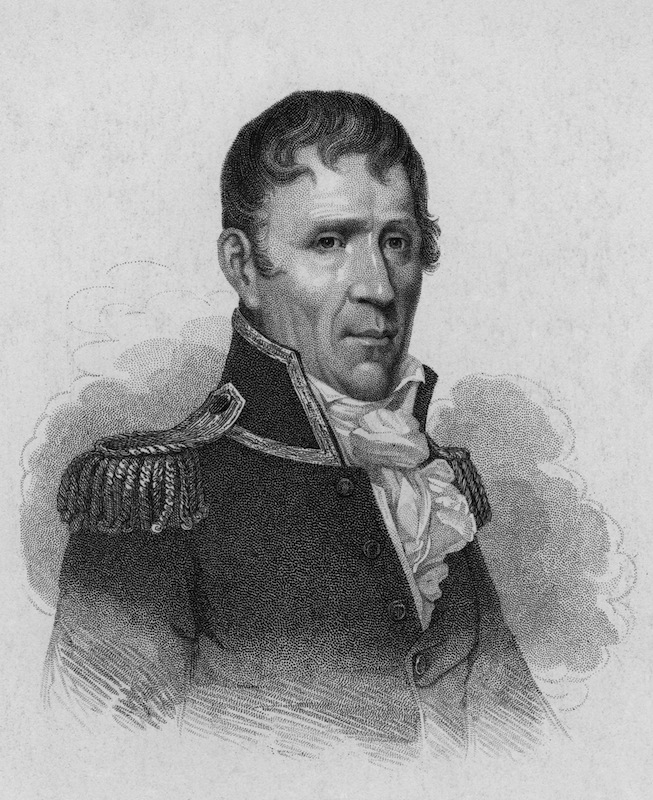
Andrew Jackson could hardly believe it himself. On Sunday, Jan. 8, 1815, after a series of battles in December and into the new year, his American troops met in a climactic struggle against the British army at New Orleans. The weather was foggy, the fighting fierce—and the results, from General Jackson’s point of view, little short of miraculous. The British lost nearly three hundred men; another 1200 were wounded, taken prisoner, or missing. Only 13 Americans were killed. “It appears,” Jackson recalled, “that the unerring hand of providence shielded my men from the powers of balls, bombs, and rockets, when every ball and bomb from our guns carried with them the mission of death.”
The bicentennial of this American Agincourt, which we commemorate this week, deserves wider attention, for, like the War of 1812 itself, the Battle of New Orleans is one of those historical events that remains stubbornly in the shadows of memory. Not every battle matters down the years; nor does every general. (Though don’t tell the generals that.) To understand the America of the 19th century, however, requires at least a passing acquaintance with what happened at New Orleans—and more than a passing acquaintance with the man who commanded the victorious forces there.
Two centuries after New Orleans made Andrew Jackson a national celebrity, setting in motion one of the most momentous military and political careers in American history, Jackson remains one of our most important and least-understood figures. The architect of American democratic populism, he was also an architect of Native American removal. An unapologetic defender of American union, he was also an unapologetic defender of African-American slavery. His contradictions were legion; so, too, were his contributions.
We need not embrace Jackson uncritically to engage with him profitably, which is part of the work now being undertaken by the newly created Andrew Jackson Foundation (of which I am a trustee) in Nashville. The mechanics of memory are complex and sometimes confounding; at its best, history captures that admirable and the ignoble—two elements that are often inextricably linked in the human experience. The foundation, which is opening a new exhibit, “Born for a Storm,” at his Nashville plantation, the Hermitage, hopes to start a new conversation about Jackson, shifting the traditional historical emphasis from his house and grounds to the meaning of his career and presidency. It is not an easy task to draw sustained attention to a man often passed over in a popular memory that zooms from the Founding to Fort Sumter, but it’s a task worth tackling.
He had come from nothing, and New Orleans gave him everything—fame and a future. Lawyer, planter, self-taught military officer, brawler and duelist, Jackson made his way from the Carolinas to Tennessee, married into Nashville’s leading family, and set out to make a life, and a name, for himself. He was deeply attached to the American experiment in liberty and in union; he believed the nation to be “one great family” and was abidingly hostile to those forces that he thought threatened the sovereignty of the will of the white majority.
Jackson’s successors found virtues in him. In drafting his own First Inaugural, Lincoln consulted Old Hickory’s pro-union proclamation to the people of South Carolina who had considered nullification in 1832-33. TR saluted Jackson’s aggressive vision of executive power. FDR admired him and his battles against entrenched financial-class interests; Truman idolized him. “He wanted sincerely to look after the little fellow who had no pull, and that’s what a president is supposed to do,” Truman remarked of Jackson in one of the best definitions of the presidency I have ever encountered.
New Orleans made Jackson’s broader influence possible. (The Treaty of Ghent, ending the war, had been signed on Christmas Eve 1814, but word had not yet reached the United States.) January 8 became a national holiday; within a decade Jackson would seek the presidency. On an anniversary of the battle, Rachel Jackson, the general’s beloved wife, was overwhelmed by the tributes to her husband. “The attention and honors paid to the General far excel a recital by my pen,” she wrote a friend. “They conducted him to the Grand Theater; his box was decorated with elegant hangings. At his appearance the theater rang with loud acclamations, Vive Jackson.”
Vive Jackson: It became a perpetual cry. At New Orleans, when surviving British soldiers came out from beneath the safety of their fallen comrades’ red coats, the image of the living among the dead struck Jackson forcibly. “I never had so grand and awful an idea of the resurrection as on that day,” Jackson recalled. For Jackson the day brought new possibilities, and, for better and for worse, a new America began emerging from the fog and the smoke of that distant morning two centuries ago.
Jon Meacham, a trustee of the Andrew Jackson Foundation, is the author of “American Lion: Andrew Jackson in the White House” (Random House, 2008).
More Must-Reads from TIME
- Inside Elon Musk’s War on Washington
- Why Do More Young Adults Have Cancer?
- Colman Domingo Leads With Radical Love
- 11 New Books to Read in February
- How to Get Better at Doing Things Alone
- Cecily Strong on Goober the Clown
- Column: The Rise of America’s Broligarchy
- Introducing the 2025 Closers
Contact us at letters@time.com